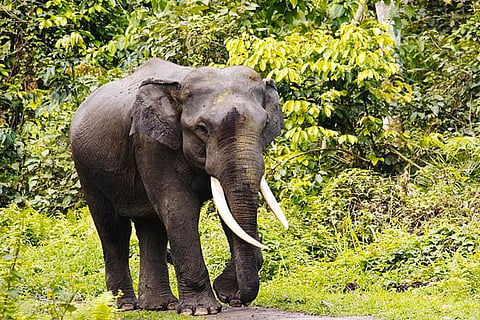

Chennai
The CBI investigation is likely to be a headache for several corporate clients who were in touch with ‘Eagle’ Rajan, Aji Bright and Priston Selva – all regional kingpins controlling the country wide illegal wildlife trade in India.
The whereabouts of ‘Eagle’ Rajan, - one of the links between corporate world and elephant poachers - now in his fifties, is currently not known after he allegedly left for Sharjah in 2015 from Chennai. He was actively liasoning with corporate bosses for nearly a decade and had made good illegal money by arranging ivory for them. His business network was hit when wildlife enforcers managed to dismantle the poaching mafia operated by Veerappan five years ago. A copy of Rajan’s diary, with addresses and mobile numbers of his customers, even from abroad, was accessed by enforcers.
“Political pressure and lack of coordination from states is a major reason why we were not able to proceed further as the consumers are settled in posh areas like Adyar Boat club, Poes Garden, Jubilee hills and South Mumbai. I am tired and retired from wildlife investigations,” said an officer who was instrumental in getting the photo of actor Salman Khan updated in the WCCB records.
“The matter would have died long back, but thanks to Justices MM Sundaresh and N Sathish Kumar who were periodically asking questions about the WCCB findings. Both the Kerala and Tamil Nadu forest departments were not co coordinating,” said Deepak Nambiar, founder, Elephant Maximum Indicus Trust (EMIT). IFS officers and forest rangers are ducking out from the elephant poaching cases that they have unearthed in the past 10 due to lack of support from State governments and other Central investigative agencies, Nambiar added. A few officials attached to the Wildlife Crime Control Bureau, including a 2009 batch IFS officer T Uma, who was the Deputy Director of WCCB, Ministry of environment and Forests, Chennai, is now running pillar to post to fight against the corporate world that consumes poached ivory from south Indian forests.
‘Lack of coordination between probe agencies helps poachers’
According to sources from Forest Department and Wildlife Crime Control Bureau (WCCB), the officials who pursued elephant poaching cases while serving in the bureau from 2016 to 2019 are now facing 21 cases of human rights violations and custodial tortures for daring to take on the influential persons.
“With government advocates and Forest officials acting in connivance with high-profile ivory customers, at least two officers have engaged lawyers on their own. After seeing this, I too opted out of wildlife crime investigations and forensics,” said a senior IFS officer now serving in an administrative post. Sources added that central agencies like ED, too, had registered cases against the same persons for illegal activities like narcotics business. But details of these cases were not shared between agencies, which only helped the poachers.
Network broken in every state to ensure privacy of the buyer never revealed
According to WWF Traffic, a wildlife investigation agency, kingpins meet customers and based on the order size, the elephant is poached. The kingpins usually pay the tribes both in Asia and Africa to monitor large tuskers. The network is broken at every state to ensure that the privacy of the buyer is not revealed. During court investigations, the poachers are remanded and convicted, but the consumers, often celebrities, go scot free. Elephant tusks, snake skin, rhino horn, tiger parts, leopard claws, bones, skins, whiskers, deer antlers; shahtoosh shawl, medicinal plants, red sander, scheduled timber and protected birds are poached. A large part of this trade is meant for the international market and has no direct domestic demand in India, but there are regular Indian corporate clients.
Visit news.dtnext.in to explore our interactive epaper!
Download the DT Next app for more exciting features!
Click here for iOS
Click here for Android